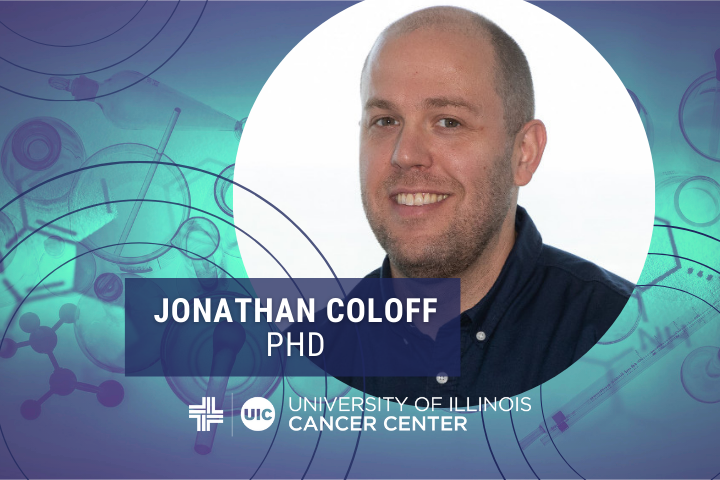
University of Illinois Cancer Center member Jonathan Coloff, PhD, recently began work on a new Method to Extend Research in Time (MERIT) R37 grant from the National Cancer Institute (NCI). The award is similar to an R01 grant but provides up to seven years of financial assistance to Early Stage Investigators who receive high scores on R01 applications.
Coloff is investigating serine removal to tackle luminal breast cancer with the initial five year $2.17 million award, which could be extended to more than $3 million.
Your latest research involves luminal breast cancer. What have you concluded in your initial research?
We discovered that unlike most other types of cancer, luminal breast cancer cannot make its own serine, an important amino acid that cancer cells need to multiply and survive. Serine is needed for a variety of important aspects of normal physiology, and in tumors it is an important building block for proteins, nucleotides (i.e., DNA and RNA), and lipids – all things that cancer cells need to proliferate. Other researchers have suggested that we may be able to treat cancer using a serine-free diet, and we believe that luminal/ER+ breast cancer would be a great candidate for such therapy.
How will your new research help patients?
Luminal breast cancer patients initially have a more favorable prognosis, in part due to the efficacy of endocrine therapies and other targeted therapies. However, a large portion of these patients eventually develop resistance to these drugs and undergo relapse, where treatment options become much more limited. While there is still a lot of work to do, our research has identified a potential vulnerability that could represent a new therapeutic option for such patients.
What are some of the major obstacles in your research?
A general problem in targeting metabolism for cancer therapy is pathway redundancy, where there are often multiple partially redundant sources of nutrients critical for cancer cells. Serine, for example, can be made by most tissues in our body and is also found in the food we eat. Our work identified a potential scenario where pathway redundancy in serine metabolism is naturally reduced in luminal breast cancer, which may make these tumors much more sensitive to removal of serine from the diet.
It is important to note, however, that consuming a serine free diet is still experimental and may have unintended side-effects, so it is essential that this approach be carefully tested in clinical trials to ensure it is safe for patients. It also appears that only some tumors will be sensitive to such a treatment, so understanding the molecular nature of each individual tumor to predict sensitivity will be important.
What methods are you developing in your work?
For this study we analyzed human tumor gene expression data with the goal of identifying scenarios where pathway redundancy is limited in specific tumor types due to lineage-dependent gene expression. We hoped this approach might identify potential vulnerabilities of specific subtypes of tumors that might be targetable with minimal side-effects. Using this approach, we have found that the two major subtypes of breast tumors – luminal and basal – express vastly different levels of PSAT1, an enzyme that is essential for making serine. We then used molecular biology and biochemical techniques to study serine metabolism in breast cancer cells, where we were able to confirm that most breast cancer cells can’t make serine, and are therefore more dependent on taking it up from the outside. This is in contrast to basal breast tumors, which are able to make plenty of serine and are not as sensitive to serine starvation.
